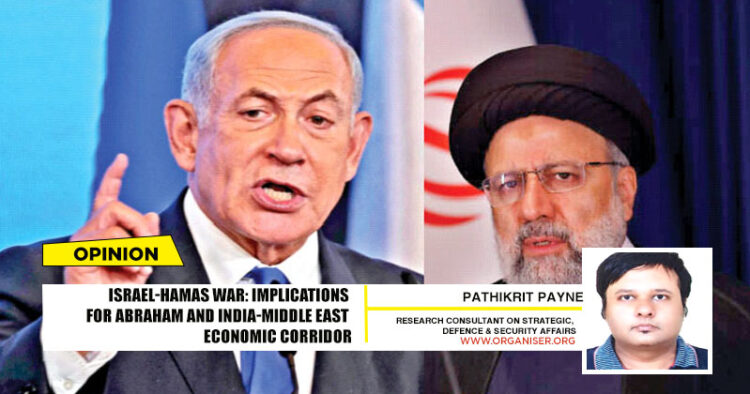On October 9, 2023, barely two days after the devasting attack by Palestinian terror organisation Hamas left several hundred dead and thousands injured in Israel, Iran based newspaper Iran Daily, published an image of Hamas terrorists on its cover page, with the title ‘Towards the End of Normalization?’. Was this the end objective of Hamas’s gruesome killing saga in Israel?
Barely a few weeks before that, Iran’s President Ebrahim Raisi, in an interview to a US television channel, had stated that America’s efforts to normalise relation between the Arab states and Israel ‘will see no success’. The US-brokered Abraham Accords had witnessed some major success in recent past with UAE, Bahrain, Morocco and Sudan having already paved way for normalisation of diplomatic relations with Israel. Hectic parlays were going on to take forward the Abraham Accords to its ultimate conclusion through initiation of diplomatic relation between Saudi Arab – the most influential country among the Arab states – and Israel. Now, the devastating attack by Hamas on the symbolic day of October 7, and the brutality on women, children, elderly and unarmed civilians, will not only play a spoiler, but also flare up passions exponentially in the entire Middle East North Africa (MENA) region – thereby sinking the region into another vicious cycle of conflicts and terror attacks.
The fundamental question then is whether the attack by Hamas and the sheer brutality that followed – which was meticulously videographed and uploaded on social media –were meant to ignite violent hate, and sabotage the Abraham Accords, as well as the India-Middle East-Europe Economic Corridor? Is Hamas acting alone in it or is a mere proxy for other major players who would prefer stalemates to continue in the entire region?
MILITARY GRADE INVASION
What Hamas did on October 7 was not a run-of-the-mill terror attack but a full-blown military grade invasion that is no less than a full-fledged declaration of war in itself. Launching more than 5000 rockets, sending terrorists in motorised paragliders, knowing exactly the areas and kibbutz, where there was reduced vigilance by the Israeli Defence Forces or Border Police Units, because of the festive seasons, having information about the rave parties at the Nova Music Festival that were going on in the Negev desert region of southern Israel, all this required considerable amount of logistical planning, intelligence inputs and coordination.
VIDEOGRAPHED, LIVE-STREAMED BRUTALITY
Worse, it was not just the attacks. It was the brutal and inhuman way in which Israeli women were molested, families were massacred, and innumerable women and children were taken hostage, all these were equally devastating just like the rocket attacks. One dreads to even wonder what would be done with those abducted women. Even the elderly and disabled were not spared. They too were dragged across the borders into Gaza Strip. The desperate cry for help of victims, the fear in their eyes, the blood in the hands of those fathers who daughters have been killed by the Hamas terrorists in front of their eyes, the fear in the eyes of children dragged across borders and having never witnessed such nightmarish saga ever before, the desperate attempts of the young people to run away from the Nova Festival when Hamas terrorists swooped in, the manner in which most were dragged out of cars and shot dead, the manner in which dead and naked bodies were desecrated, all these only reflected the most rabid and devilish hatred Hamas terrorists had for the people of Israel, and what happens when even for a day Israel lowers its guard against such terror organisations.

What was more horrific was that all this was videographed and uploaded on social media, which shook the conscience of people across the world. It is reported that the Chief of Hamas, Ismail Haniyeh, who has found a safe haven in Qatar, was watching the proceedings on television and celebrating the massacre of Israelis, with his fellow leaders of Hamas.
However, celebratory tweets and video clips of rejoicing over the gruesome killing of Israeli civilians could be witnessed from many other places in the Middle East and elsewhere too. Social Media, especially Twitter showed how much the world has become divided over the issue of this attack. Perhaps, this was one of the major objectives of Hamas, to deeply polarise people once again.
HAMAS EXACTLY KNEW WHAT IT WAS DOING
In essence, the leadership of Hamas exactly knew what it was doing. It knew very well that such a scale of attack would mean that Israel would vow to reduce Gaza literally to rubble. They knew that their own terror infrastructure is based in the middle of civilian hotspots of Gaza Strip, and that any violent retribution by Israel through its air force or artillery, would mean massive fatalities among the residents of Gaza Strip. They exactly knew that passions have flared up so much by the visuals of torture and massacre of Israeli civilians that Israel would not stop unless Gaza is literally turned into a relic of its past or burnt down just as forest fires devour thousands of acres of woods and turn it to a pile of ash. That would be the opportune time perhaps for which Hamas would wait to play the victim card. Hamas and its supporting ecosystem would then take footage of such devastations, make them viral through social media to inflate passions in the Arab states of MENA region and in all other Muslim majority states to push forward its own (and of its financiers perhaps) discreet objective to raise voice against any kind of reconciliation with Israel as part of Abraham Accords.
POTENTIAL OF LARGER CONFLICT
As things stand now, with Israel continuing its massive aerial bombing of Gaza Strip, possibly to be followed by boots on ground, the potential chance of Iran-backed Hezbollah declaring a full-blown war on Israel cannot be ruled out. In such a scenario, with Israel literally waging a two-frontal war, the outcome of such a situation on popular sentiments in the Arab world would turn severely against any kind of reconciliation with Israel, given the ingrained animosity that already exists. Against this backdrop, even if the governments of such Arab states like Saudi Arab would be inclined to normalise relationship with Israel, they would have to weigh it against the emerging situation on the domestic front, and the larger MENA region. Any decision which would be construed as ‘extremely pro-Israel’ by the larger public, may foment the rise of organisations like Muslim Brotherhood all over again, a real nightmare for many of the regimes there. Therefore, most would have to do a tightrope walk and pause negotiations for the time being. This itself would mean ‘Mission Accomplished’ for some.
INDIA-MIDDLE EAST-EUROPE ECONOMIC CORRIDOR
One has to remember that reconciliation of relation between Arab states of the Middle East, especially Saudi Arab, and Israel, is a critical precursor to making the IMEEC a success, since the multi-modal corridor that would have its origin from Mumbai and Mundra Port in India, would traverse through Saudi Arab and Jordan before reaching the strategic port of Haifa in Israel, for its final leg of journey into Europe. The more the conflict between Israel and Hamas is prolonged, the more would it put the plan of IMEEC in jeopardy, through delay or postponement, if not abandonment. The India-Middle East-Europe Economic Corridor would have created the most preferred and resilient supply chain that would also have aided in decoupling from China to a certain extent, and would have created a win-win situation for Europe, Middle East and India. It would have facilitated investments from Middle East to India, while facilitating seamless supply of goods and services from India to the Middle East and Europe.
As things stand now, the situation is so volatile, that the world would be lucky if it remains restricted to an Israel-Hamas face-off only.
DANGEROUS POSSIBILITIES
To put things in perspective, in the aftermath of the attack, Iranian President Ebrahim Raisi, as per reports, had spoken to the top leadership of Hamas and Islamic Jihad Movement, and termed the Hamas attack on Israel as ‘proud operation’ and ‘a great victory’. Iran’s supreme leader Ayatollah Ali Khamenei’s Senior Advisor, Ali Akbar Velayati stated, “This victorious operation, which will facilitate and accelerate the collapse of the Zionist regime, promises the impending destruction of the Zionist regime”. The moot point is whether these statements are indications enough of the extent of support Iran may have given to Hamas, and not just to the Palestinian cause. Tehran though has flatly denied any involvement in the attack by Hamas on Israel. Nevertheless, the potential possibility of Israel-Iran face-off taking a more dangerous turn in the near future, after a major part of Hamas hideouts in Gaza Strip is decimated, cannot be ruled out. Also, for countries like the Saudi Arab and UAE, from realistic perspective, if there is one country whose policies continue to remain a headache, it is invariably Qatar. In hindsight therefore, the political leadership of these countries would not mind if Hamas, allegedly backed by Qatar and Iran, be cut down to size by Israel. Both UAE and Saudi Arab know how the acts of Hamas can inspire other radical extremist terrorist groups operating in the region, to attempt similar attacks in Arab states as well. Arab states like UAE and Saudi Arab continue to face threats from ISIS, Al Qaeda and Yemen-based Houthis. Both have concerns with potential revival of Muslim Brotherhood Movement in Middle East, of which Hamas is an offshoot. As if these were not good enough, how things would shape up if, and when, Israel goes for major covert operations against Iran or Qatar, for backing Hamas, and how major power blocs would react to such developments, remain a major issue of worry for all.




















Comments